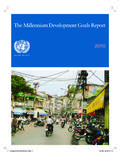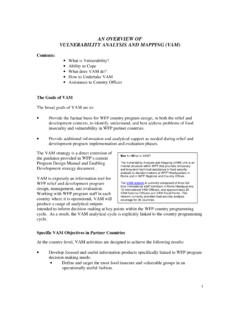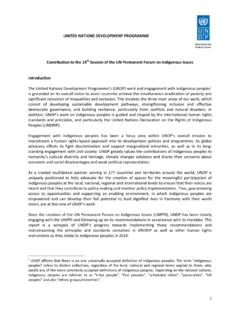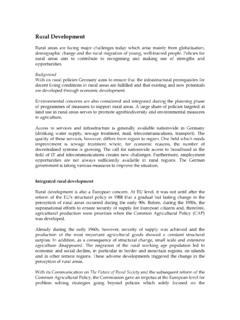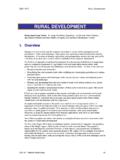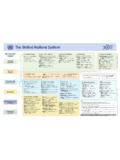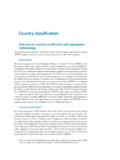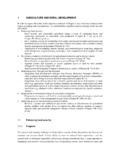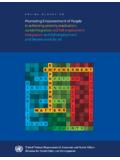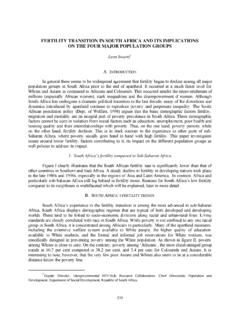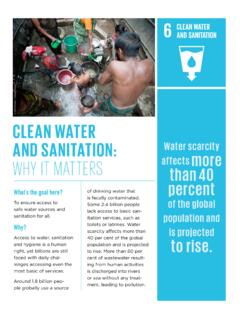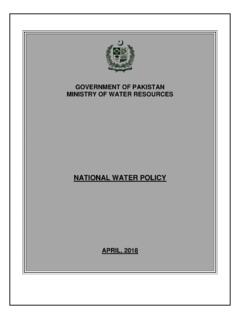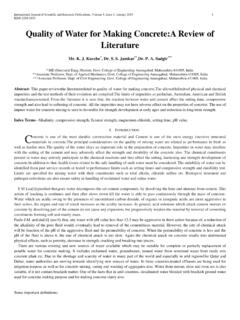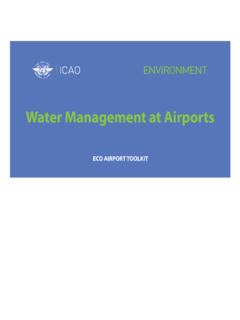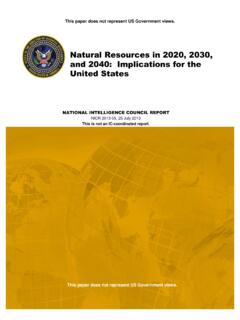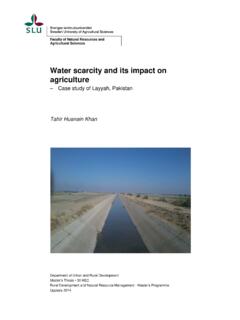Transcription of The Human Right to Water and Sanitation - United Nations
1 Media :01 issue briefs 1/6/11 11:04 P gina 1. The Human Right to Water and Sanitation Media brief Today Safe drinking Water and adequate Sanitation are crucial 884 million people in the world do not have for poverty reduction, crucial for sustainable access to safe drinking- Water . development and crucial for achieving any and every one of the Millennium Development Goals billion people lack access to basic Ban Ki-moon, UN Secretary General Sanitation , 40% of the world's population. The UN commitment The target of Millennium Development Goal 7 calls to halve, by 2015, the proportion A/RES/64/292. of the population without sustainable access to safe drinking Water and basic Votes Sanitation .
2 In Favour: 122. On 28 July 2010 the United Nations General Assembly through Resolution Against: 0. A/RES/64/292 declared safe and clean drinking Water and Sanitation a Human Right Abstentions: 41. essential to the full enjoyment of life and all other Human rights. Absent: 29. Why is it important? Ensuring access to Water and Sanitation as Human rights constitute an important step towards making it a reality for everyone. It means that: Access to safe Water and basic Sanitation is a legal entitlement, rather than a commodity or service provided on a charitable basis;. Achieving basic and improved levels of access should be accelerated;. The least served are better targeted and therefore inequalities decreased.
3 Communities and vulnerable groups will be empowered to take part in decision-making processes;. The means and mechanisms available in the United Nations Human rights system will be used to monitor the progress of Nations in realizing the Right to Water and Sanitation to hold governments accountable. What does it mean? In November 2002, the UN Committee on Economic, Social and Cultural Rights adopted its general comment No. 15 on the Right to Water stating that: The Human Right to Water entitles everyone to sufficient, safe, acceptable, physically accessible and affordable Water for personal and domestic uses.. Universal access to Sanitation is, not only fundamental for Human dignity and privacy, but is one of the principal mechanisms for protecting the quality of Water resources.
4 Furthermore, in April 2011, the Human Rights Council adopted, through Resolution 16/2, access to safe drinking Water and Sanitation as a Human Right : a Right to life and to Human dignity. UN- Water Decade Programme on Advocacy and Communication and Water Supply and Sanitation Collaborative Council 1. Media :01 issue briefs 1/6/11 11:04 P gina 2. The Human Right to Water and Sanitation Media brief Sufficient The Water supply and Sanitation facility for each person must be continuous and sufficient for personal and domestic uses. These uses ordinarily include drinking, personal Sanitation , washing of clothes, food preparation and personal and household hygiene. According to the World Health Organization (WHO), between 50 and 100.
5 Litres of Water per person per day are needed to ensure that most basic needs are met and few health concerns arise. Most of the people categorized as lacking access to clean Water use about 5 litres a day-one tenth of the average daily amount used in rich countries to flush toilets. UNDP. Human Development Report 2006. Beyond scarcity : Power, poverty and the global Water crisis. 2006. Most people need at least 2 litres of safe Water per capita per day for food preparation. WHO. The Right to Water . 2003. The basic requirement of drinking Water for a lactating woman engaged in even moderate physical activity is litres a day. UNDP. Human Development Report 2006. Beyond scarcity : Power, poverty and the global Water crisis.
6 2006. The Human Right to Water and Sanitation in practice in South Africa The prepayment meters in Phiri, a township in Soweto, South Africa were designed to supply the free basic Water supply of 25 litres per person per day or 6,000 litres per household per month. Once this allocation was reached, the meters automatically shut off the supply. [ ] In its judgement, the High Court ruled that the City of Johannesburg's forced prepayment Water meters scheme in Phiri with automatic shut-off mechanisms was unlawful, unreasonable and unconstitutional [ ] The Court ordered the City to provide Phiri residents with 50 litres of free Water per person per day. This was an increase from the previous allocation whereby each household (on average containing 16 persons) was provided with 200 litres per day.
7 The Court noted that 25 litres per person was insufficient, especially for people living with HIV/AIDS. The Court noted that the City had the Water and the financial resources to provide 50 litres per person per day, including through funds provided by the national Government for Water provision that the City had chosen thus far not to use for the benefit of the poor. [ ] The City of Johannesburg appealed against this judgement to the Supreme Court of Appeal. It upheld the appeal and ordered that 42 litres of Water per Phiri resident per day would constitute sufficient Water instead of the 50 litres ordered by the High Court. Contradicting the findings of both the High Court and the Supreme Court of Appeal, the Constitutional Court found that the free basic Water policy adopted by the City of 25 litres per person per day was reasonable with regard to the Constitution and that the use of prepaid Water meters was lawful.
8 UN, OHCHR, UN-Habitat, WHO. (The) Right to Water , Fact Sheet No, 35. 2010. 2 UN- Water Decade Programme on Advocacy and Communication and Water Supply and Sanitation Collaborative Council Media :01 issue briefs 1/6/11 11:04 P gina 3. Media brief The Human Right to Water and Sanitation Safe The Water required for personal or domestic use must be safe, therefore free from micro-organisms, chemical substances and radiological hazards that constitute a threat to health. Measures of drinking- Water safety are usually defined by national and/or local standards. WHO's Guidelines for drinking- Water quality provide a basis for the development of national standards that, if properly implemented, will ensure the safety of drinking- Water .
9 Everyone is entitled to safe and adequate Sanitation . Facilities must be situated where physical security can be safeguarded. Ensuring safe Sanitation also requires substantial hygiene education and promotion. This means toilets must be available for use at all times of the day or night and must be hygienic; wastewater and excreta safely disposed and toilets constructed to prevent collapse. Services must ensure privacy and Water points should be positioned to enable use for personal hygiene, including menstrual hygiene. At any one time, close to half of all people in developing countries are suffering from health problems caused by poor Water and Sanitation . [ ] Together, unclean Water and poor Sanitation are the world's second biggest killer of children.
10 [ ] It has been calculated that 443 million school days are lost each year to Water -related illness. UNDP. Human Development Report 2006. Beyond scarcity : Power, poverty and the global Water crisis. 2006. The Human Right to Water and Sanitation in practice in Indonesia, Argentina and the United States of America Through the Indonesia Sanitation Development Program (ISSDP), an approach for promoting gender and social equity in planning, decision-making and implementation of urban Sanitation at both city and community levels has been developed, trialled and applied. Awareness campaigns targeting the official working group on Sanitation , city sub-district officials and community groups have been effective for ensuring women's voices are heard by decision makers.
